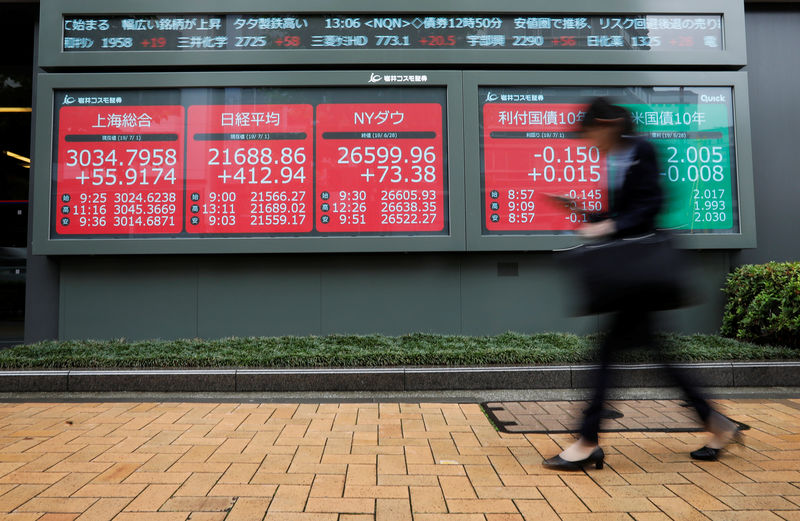By Hideyuki Sano and Noah Sin
TOKYO/HONG KONG (Reuters) - Asian shares slipped on Friday, knocking a global stock index off its path to hitting an all-time peak as investors turned cautious, fearing a new U.S. law backing Hong Kong protesters could torpedo efforts to end the U.S.-China trade war.
MSCI All Country world index (MIWD00000PUS), whichtracks shares in 49 countries, was down 0.39% at 548.48, less than 0.4% away from all-time peak hit in January last year before the start of U.S.-China trade war.
European stocks look set to start Friday lower with pan-region Euro Stoxx 50 futures (STXEc1) down 0.3% in early trade, following a bleak Asian morning session.
MSCI's broadest index of Asia-Pacific shares outside Japan (MIAPJ0000PUS) fell more than 1%. Hong Kong (HSI) led the dip with losses of 2%. South Korean shares (KS11) lost 1.4% and Japan's Nikkei (N225) eased 0.5%.
China's blue-chips (CSI300) gave up 1.3% a day before the country reports manufacturing activity, which analysts polled by Reuters expect to have shrunk for seventh straight month in November.
Markets were sold off due to uncertainty over how U.S. markets will perceive the latest clash between Washington and Beijing over Hong Kong.
Traders on Wall Street will commence a half-day session on Friday following Thursday's Thanksgiving holiday. U.S. S&P 500 mini futures (ESc1) were down 0.3%.
China warned the United States on Thursday it would take "firm counter measures" in response to U.S. legislation backing anti-government protesters in Hong Kong.
Anthony Chan, chief Asia investment strategist at Union Bancaire Privée in Hong Kong, said the market is still erring on the side of caution especially as the year-end approaches.
"There is still downward pressure on earnings. That's why when there is (negative) geopolitical news, some funds might want to sell and lock in their performance," he said.
But on the whole, investors are now betting that while the U.S. legislation spoils the mood, ultimately it remained in the interest of both Washington and Beijing to move forward with talks to get a trade deal.
"The working assumption for most investors is that this will not derail the trade talks, given China is suffering from an economic slowdown," said Norihiro Fujito, chief investment strategist at Mitsubishi UFJ Morgan Stanley (NYSE:MS) Securities.
Sentiment in the region has enjoyed an additional boost from a strong share performance this week by Alibaba (NYSE:BABA) Group (HK:9988), Asia's largest firm by market capitalisation. Alibaba has risen as much as 16% since their IPO in Hong Kong on Tuesday.
(For a graphic on REFILED MSCI ACWI, MSCI AXJ Nov 29 2019 click, https://fingfx.thomsonreuters.com/gfx/mkt/12/9300/9212/REFILED%20MSCI%20ACWI,%20MSCI%20AXJ%20Nov%2029%202019.jpg)
Major currencies were kept in tight ranges amid a dearth of any other significant developments in Sino-U.S. trade talks.
Against the yen, the dollar traded at 109.46 yen , near its six-month peak of 109.61 set on Wednesday.
The euro stood at $1.1009 (EUR=), stuck in a tight range for the past week.
The British pound traded at $1.2916 , staying in its $1.28-1.30 range since mid-October.
As trading in major currencies slumbers, their implied volatilities, key gauges of expected swings measured by their option prices, plumbed to new record lows this week.
Among emerging currencies, the Chilean peso's 3.5% plunge this week to an all-time low, and brought its decline during November to 10% following protests over inequality that turned violent again this week.
In response, the central bank said it would start a six-month programme of foreign currency sales from Monday in a bid to stabilise the peso, earmarking $20 billion for the programme.
Oil prices were little changed on Friday but look set to have one of the best performances in recent months in November, with Brent futures (LCOc1) up almost 5.5% month-on-month, which would be the biggest gain since April.
U.S. crude futures (CLc1) were little changed at $58.06 per barrel. They have risen more than 7% this month.
